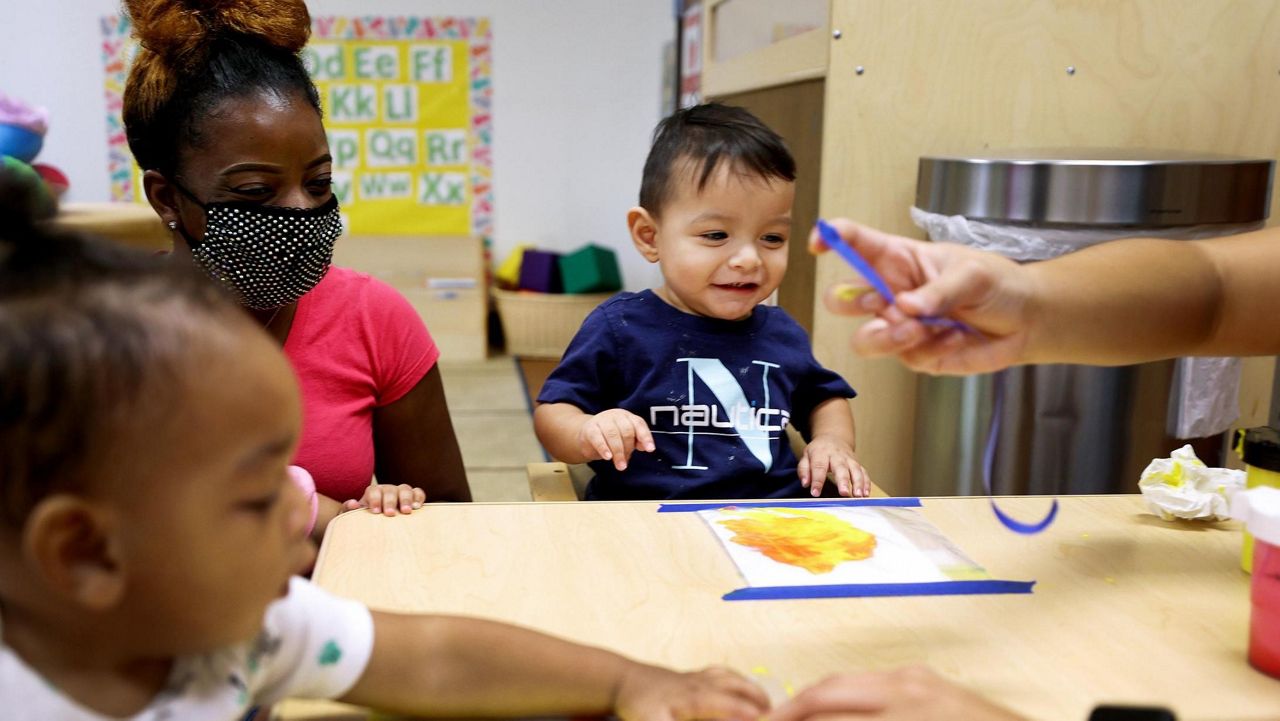LEXINGTON, Ky. — The Biden Administration’s $3.5 trillion Build Back Better Act (BBB) contains provisions that, if passed, could drastically change the lives of parents across the nation and in Kentucky that pay for child care.
What You Need To Know
- Kentucky has 325,750 children under age 5
- The BBB plan creates a preschool program for all children that is completely free
- The expansion of child care assistance would occur in two phases
- The average annual cost of full-time child care for an infant in Kentucky is $6,258
Even the slimmed-down $1.5 trillion version of BBB currently being considered includes two significant investments in early child care: Two years of universal preschool, and a sliding scale limit on child care costs for families. While the House and Senate are still sorting out the details of the legislation, BBB would ultimately create universal preschool and make child care more affordable.
There are 325,750 children in Kentucky under age 5 and another 114,500 3- and 4-year-olds. The BBB plan creates a preschool program for all children that is completely free to families that public schools, licensed child care programs, Head Start grantees, or a combination of those entities, may implement.
The expansion of child care assistance would occur in two phases. The first phase would occur during the initial three years of the program, which would expand Kentucky’s existing Child Care and Development Block Grant (CCDBG) to cap child care costs at a sliding scale that reaches no more than 7% of income for low- and middle-income Kentuckians.
The second stage, beginning in the fiscal year 2025, would create a shared state-federal entitlement to all families regardless of income, keeping the sliding scale of up to 7% and making child care no-cost for Kentuckians earning under 75% of the state median income, which in Kentucky was $52,295 in 2019. As a result, child care would be free for Kentucky families making less than approximately $39,221 and cut costs by 32% for a Kentucky family with an income of roughly $70,000.
“Kentuckians’ economic future and family well-being hinge on passage of the BBB now in front of Congress,” according to an analysis by the Kentucky Center for Economic Policy. “The act would lower family costs on necessities ranging from child care to higher education, from health care to housing.”
The Center for American Progress estimates the average annual cost of child care nationwide has nearly doubled over the past two years. At the same time, the average yearly cost of child care in Kentucky is among the lowest in the nation, but remains a formidable expense for families. The average annual cost of full-time child care for an infant in Kentucky is $6,258 and becomes more burdensome for low-income families, parents with more than one child, single mothers and parents of children with special needs.
Tomas Ramirez, 40, of Lexington, said the provisions would have a profound financial effect on his life. The engaged father of two children, ages 2 and 3, works full time and earns more than $40,000 per year, but less than $70,000. He said he spent $13,000 on child care in 2020 and will spend about the same this year and next.
“The child tax credits help some, but not much because child care is taking up quite a bit of my paycheck,” he said. “It's just difficult when it’s taking a large percentage of my paycheck every month at what I consider an affordable place compared to others in the area.”
Ramirez said he does receive some financial assistance, but that help pales in comparison to the total cost.
“I think the plan would make child care free for families making less than $40,000 a year,” Ramirez said. “I make more than that, but not a lot more than that. I have to put one whole paycheck each month toward child care. That's not really sustainable over the long term. I feel like I'm working hard and doing the best I can with two kids. I know it's a temporary cost — it's not like they're going to need day care forever — but it’s tough starting a family, and those initial costs make it even more difficult.”
Ramirez said the provisions in BBB would be a “game-changer” for him and many other parents he knows.
“The income saved from not paying for child care can go toward buying consumer goods, paying for utilities and other bills, rent and other necessities, or save it to help buy a house,” Ramirez said. “I think of child care as an investment in education. From my understanding, the pre-K and Head Start programs were not initially thought of by the government as normal, paid-for curriculum. If you're trying to invest in children, just like you invest in a career or tuition for college, it’s the same thing. I think it's important.”



